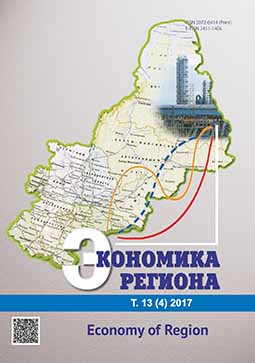Прогнозирование социально-экономического развития российских регионов
Forecasting of Socio-Economic Development of the Russian Regions
Author(s): Galina Yurievna Gagarina, Evgeny Ivanovich Dzyuba, Roman Vladimirovich Gubarev, Fanil Saitovich FayzullinSubject(s): Economy, Geography, Regional studies
Published by: Институт экономики Уральского отделения Российской академии наук
Keywords: efficiency of public administration; evaluation methodology; spatial development; interregional differentiation; regional socio-economic development; systemic approach; clustering of regions; neuromod
Summary/Abstract: The regional differentiation makes impossible the sustainable socio-economic development of the subjects of the Russian Federation without the monitoring public governance results in space and time. Despite the comprehensive approach of the current procedure, approved by the federal government, it does not adequately assess the executive authorities effectiveness. Its main problem is the impossibility to assume such important administrative function as forecasting the social and economic development of Russian territorial subjects. The authors propose an alternative methodology on the basis of the system economic theory. This technique is implemented in several consecutive stages. Firstly, we develop the system of 30 indicators. Secondly, we normalize the values of the indicators using the method of pattern. Thirdly, we calculate the index of the social and economic development of Russian regions for 2011–2015 assuming that the indicators are equal. Last, we group Russian regions into clusters according to the level of their social and economic development using neural network technologies (Kohonen selforganizing maps). Only 9 in 80 subjects of the Russian Federation (RF) had the degree of realizing the social and economic potential higher than 40 % during the period under consideration. In 2011–2015, the most of regions had a low and lower than average level of social and economic development (with an aggregate share about 64.3 %). It means that, under current conditions, the majority of the RF regions have considerable reserves for realizing their social-economic potential. In particular, the absence of the territorial subjects with a high level of social and economic development proves that. The authors have simulated the social and economic situation of the RF subjects by means of an adequate Bayesian neural networks. The obtained results can be used as the basis for further research in the field of evaluating executive authorities effectiveness and forecasting the level of social and economic development of Russian regions.
Journal: Экономика региона
- Issue Year: 13/2017
- Issue No: 4
- Page Range: 1080-1094
- Page Count: 14
- Language: Russian

